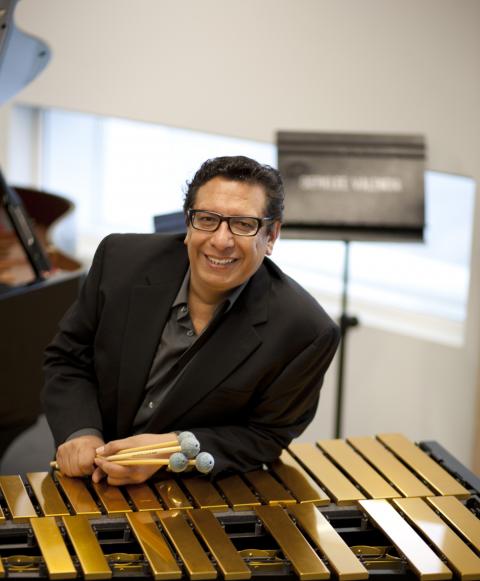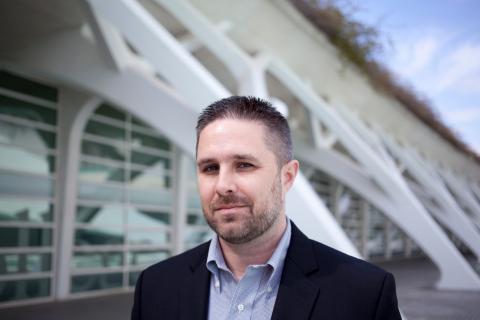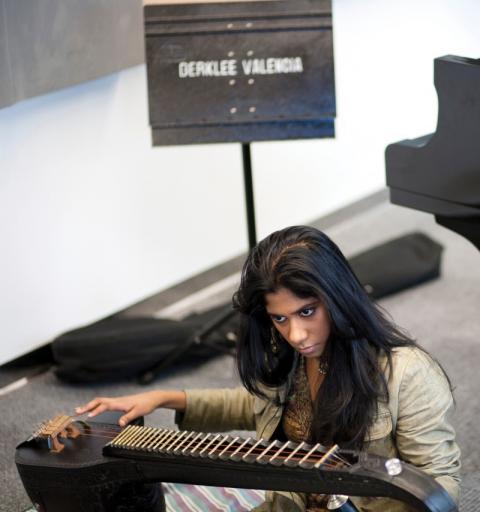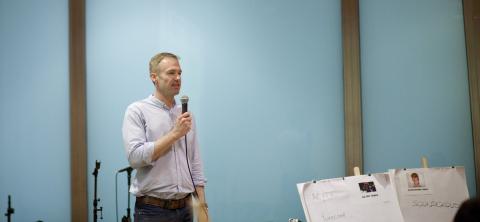A Successful Liftoff in Valencia

On July 15, a fresh crop of graduates walked across the stage at the Palau de les Arts Reina Sofia in Valencia, Spain, to receive the first master’s degrees bearing the Berklee imprimatur. Among the many noteworthy aspects of the event is that it took place in Spain and not at Berklee’s Boston campus. In addition, the new graduates who participated in the inaugural year of Berklee Valencia’s one-year graduate programs are an unusually diverse group musically and culturally. They include seasoned professionals, graduates from prestigious international conservatories, and some who earned undergraduate degrees from Berklee’s Boston campus before continuing their educational journey in Valencia. All came in search of a unique cross-cultural, musically rich experience. They arrived as strangers but leave as a tight-knit group, transformed musically and personally.
Upon hearing about the latest developments in Valencia, some questions have come to the minds of Berklee observers. Why Valencia? Why now? Why these majors? In the pages that follow, we’ll shed light on these questions and the contours of the Berklee in Valencia experience.
Pioneer Celebration
In his remarks to the charter class of Berklee Valencia at the July graduation, President Roger Brown stated, “The world’s great innovators, pioneers, entrepreneurs, and artists all have something in common with you: You are prime movers. You had a lot of courage and drive to come join a new program offered in a location new to Berklee.” Brown charged the graduates to bring courage and innovation to their work and not to lose sight of the sense of family that they had developed.
Indeed, the 74 grads from 27 different countries have forged strong musical partnerships and close personal bonds during nearly 11 months working and learning together in the fledgling program. All shared the feeling of accomplishment and camaraderie of explorers after traversing unknown territory together.
Stephen Webber, the program director for the master’s degree major in music technology innovation, also addressed the grads at the ceremony. “This is a young campus,” he noted. “It has the pulsating, youthful energy of a start-up.” Senior Vice President for Academic Affairs/Provost Larry Simpson spoke of the administration’s goal to create something in Valencia that is very different from the educational offerings of the Boston campus. “The programs you have matriculated through didn’t exist before,” Simpson said.
Becoming Truly Global
As with most audacious ventures, there were some bumps on the road to creating Berklee’s second campus. For seven years, parties in Spain and Boston worked tirelessly to see the vision coalesce. President Brown speaks of a 2005 visit to his office by Spanish composer José Mariá Cano as pivotal for solidifying the partnership between Berklee and Valencia. A modern renaissance man, Cano was a member of the Spanish supergroup Mecano and has penned a string of international hits as well as an opera. He is also a celebrated visual artist. Recalling Cano’s visit, Brown says, “He convinced me and others that a collaboration between Berklee and Valencia would be a constructive opportunity.” Fittingly, Cano was the commencement’s guest speaker at the midsummer ceremony.
Before Brown and Cano’s meeting, however, Larry Monroe, as vice president of Berklee’s Office of International Programs, was bringing Berklee to other cultures and had met with people in Spain who hoped Berklee would build a campus in Valencia. After all, Valencia has deep music traditions and a musical association with 200,000 members. Fully half of Spain’s musicians reside in the region. Its proximity to northern Africa, the Middle East, and the rest of Europe could offer musicians in these locales easier access to a Berklee education. President Roger Brown saw the initiative as an opportunity to further develop Berklee’s international profile.
Various challenges arose in the succeeding years (including the worldwide economic collapse of 2008) making it clear that the approach needed rethinking. Guillermo Cisneros, Berklee’s current vice president for global initiatives, and a native of Spain, began leading the Valencia Campus project as its executive director. His task was to redefine the Valencia strategy according to the new environment. After adjusting the project’s goals and scope, Cisneros and others agreed that the site for the new Berklee’s campus should be the Palau de les Arts Reina Sofia. The celebrated arts complex is a locus for classical orchestras, opera, and ballet, and Berklee—representing contemporary music—would add a new dimension. “It’s such an inspiring place,” says Cisneros. “It instantly felt like the right home for the campus.”
In 2010, Berklee’s board of trustees approved the Valencia project and as the project gained momentum, others joined the effort. Trustee Ann Kreis invited Susan Solomont, Farah Siraj, and Frank Gelardin, among others, to join her and trustee Luis Alvarez on an advisory board for Berklee’s Valencia campus. “Both Luis and Ann had tremendous faith in this project,” Cisneros says. “They were an inspiration to the team when we faced obstacles. Ann was really helpful in developing our marketing and our advancement efforts in Spain to draw in sponsors and supporters to help establish funds for scholarships.”

Victor Mendoza
Photos by Histeria Producciones
Cisneros and Mariá Iturriaga (a fellow Spaniard who joined the project in its early stages) began building a staff in Spain. Jorge Rostoll (now the director of operations) was the first to occupy an office at the new site. “Jorge was the first person actually from Valencia to join the team,” says Cisneros. “He oversaw the building of classrooms and the recording studios, and made sure Berklee got world-class facilities completed on time and within the budget.” Iturriaga (now the associate dean for enrollment and career development) worked with Mark Campbell and Damien Bracken (of Berklee Boston’s admissions and marketing staff) and Sophie Maricq (the assistant director of communications for global initiatives) to develop a communications strategy to draw students from around the world. “This was a key element,” says Cisneros. “It was important to attract the right people to Berklee’s first master’s degree programs.”
Meanwhile, Camille Colatosti, Berklee’s dean of institutional assessment and graduate studies, worked with department chairs and deans in Boston to design the curriculum for the new campus. They determined that Valencia would offer master’s degrees in four areas of study: contemporary studio performance (directed by Victor Mendoza), global entertainment and music business (directed by Allen Bargfrede), scoring for film, television, and video games (currently directed by Lucio Godoy), music technology innovation (directed by Stephen Webber).
The directors for the first three areas of graduate study hired faculty members and pored through student applications. In the fall of 2012, after many auditions and interviews and much behind-the-scenes work, Valencia opened its doors to 74 graduate students. The music technology innovation majors just began their studies during the fall of 2013. Greg Fritze has started developing workshops and designing the curriculum for a symphonic band major. “Greg is a legend among the symphonic band musicians of Valencia,” says Cisneros. “He helped us understand their musical traditions and how we could contribute.”
Valencia’s first educational offerings were two summer programs in 2011 focusing on songwriting and flamenco studies. In January 2012, 26 undergraduate students from Boston became the first group to go to Valencia for a semester abroad. Finally, in Spetember 2012, the first graduate students arrived.
“We moved very fast and encountered major challenges doing everything for the first time here,” says Cisneros. There were new facilities in a new country, new programs and a new team. Through extraordinary cooperation between the teams in Boston and Valencia, everything went according to plan and exceeded expectations. “This first class was outstanding and the program is growing,” Cisneros says. “It would not have been possible without the vision of Roger Brown. He knew that for Berklee to become truly global, we needed a presence in other countries instead of waiting for the world to come to us. He also wanted to create a laboratory for new musical ideas where new leaders of the global music industry could study. This vision inspired and energized all of us working on this project.”
“It Worked!”

Brian Cole
Photo by Histeria Producciones
On June 1, 2012, after serving for seven years as the associate dean at the Conservatory of Music of Puerto Rico, Cole took his post at Berklee Valencia. He supervised graduate and undergraduate performance programs in classical, jazz, and Caribbean music, as well as orchestral and choral conducting.
For the Valencia campus, the mission has been to design and teach educational programs that are distinct from those in Boston. Given that Valencia’s primary focus is graduate studies, the curriculum differs in academic rigor, but Cole and company believed they had to dig deeper for even greater differentiation. “Berklee Boston is such a successful campus that the bar was set quite high for us here in Valencia,” he says. “Students are coming here looking for something that will add another aspect to their artist portfolio.”
The architects of the graduate program designed it to be completed in a single, highly intense year rather than spreading it over the course of two years as other master’s programs do. Valencia’s charter class included many young professional musicians to whom the idea of investing a single year really appealed. “It’s a lot harder for someone to take off two years from working,” Cole explains. “As well, from a cost standpoint, they save one year’s tuition.”
While the curriculum is focused, it allows students to explore different directions and gain professional experience. Many among the first graduates completed an internship as part of their final project.
Some graduates made time for professional work as well. “Some of our film scoring majors also fit in professional projects while they were here,” Cole says. “Maria Grigoryeva, a very talented Russian composer and violinist, worked steadily with musicians from her country. She worked on some of those projects with her teachers. Others—David Antolín Gil from Valencia and Jonas Bühler of Zurich—collaborated on the score for a professional film project.”
The Valencia campus places an emphasis on preparing students to navigate an unpredictable music industry. “This industry evolves faster than any other—except technology,” Cole says. “What’s relevant now may need to be rethought in two years. I like to think that we’re not just training people to be composers, performers, or technologists; we want them to have the ability to shape their own careers.”
Musicians without Borders

Ganavya Doraiswamy
Photo by Histeria Producciones
Mendoza had been a Berklee faculty member for decades before he signed on for a director role at the Valencia campus. In the spring of 2012, he arrived in Spain and started building his faculty team and auditioning students. There were many 12-hour days as he hunted for diverse talent around which to create an environment for blending multichromatic global styles. Mendoza listened to applicant recordings and conducted auditions. Those from far-off lands auditioned via Skype.
The academic backgrounds of the applicants were quite varied, but deep musical talent was the deciding factor. “Ganavya Doraiswamy didn’t have a traditional education,” Mendoza says. “Her parents are Indian, but she grew up primarily in Miami and spent her middle-school years back in India where she got musical training from her grandmother.” Doraiswamy has penned authoritative books on South Indian music, but she couldn’t read music when she auditioned.
Despite that shortcoming, Mendoza was overwhelmed by her talent. “When I asked her to sing for me, I was completely mesmerized,” he recalls. “I felt I couldn’t exclude someone like her.” Not only did Doraiswamy’s classmates soon clamor to collaborate with her but producer Javier Limón also recorded with her and film scoring director Laura Karpman used her voice on a movie score. “Laura told me that we had a gold mine with some of these students,” Mendoza says.
Mendoza encourages his students to broaden their horizons by experimenting with musicians from diverse lands and musical styles. “President Brown refers to this place as a musical laboratory, and that’s just what it is,” Mendoza says. “The students are pushing the boundaries. If someone comes here as a great bebop player, we might point them toward flamenco, Arabic, or Balkan music. [Students have] told me that they never could have grown in this way at home because they didn’t have friends to play these styles with. In addition to what we teach them, they teach each other a lot.”
Mendoza wants students at Valencia to be artistically restless, constantly searching, and confident about trying new things. A case in point is Patricia Ramón, who came from Argentina to the campus. A gifted singer and pianist, Ramón found herself artistically in Valencia according to Mendoza. “She didn’t want to just be a tango singer,” Mendoza emphasizes. “She felt she’d already done that. She was working on her songwriting, and then one day she showed up with a didgeridoo. This wasn’t a frivolous choice; she’s serious about learning the instrument.” Ramón played her didgeridoo with the all-female student improvisational group Zaumd, an ensemble formed by bassist Priscilla Vela. Adding Stephen Webber playing turntable, the group appeared at the experimental Sónar Festival in Barcelona and the audience absolutely loved them.
Mendoza produced the July 14 commencement concert and it was quite evident that the student performers and writers had broken through self-imposed stylistic boundaries to make musical discoveries. That concert demonstrated artistic maturity and adventurous exploration that typifies the artistic ideals of Berklee Valencia. (See the “Lab Report” sidebar below.)
Down to Business

Allen Bargfrede
Photo by Histeria Producciones
Even though he lacked a network to draw on when he started, the ever-resourceful Bargfrede assembled a team of faculty members from across Europe. “I spent the fall of 2011 traveling around Europe having lunch with anyone I could to find the right teachers,” he recalls. He chose people from Madrid, Barcelona, London, and Paris who come in once each week to teach. “They’re all active in the music industry in their countries, so the students get exposure to professionals.”
It was determined that the Valencia program would prepare the grads to work in a global business environment and place an emphasis on entrepreneurship. “We decided to position this as a program that’s up to date with what’s happening in Europe and the U.S.,” Bargfrede says. “A lot of innovation in today’s industry is coming from young entrepreneurs rather than people who have worked at record labels for 30 years. So we are looking into starting [a new business] incubator with real support and possibly grants for projects [that] the students create here. We’re starting a Valencia student label through Warner Music and a concert series at the halls of the Palau with Live Nation. The series will give performance students a chance to play and the business students a real-life experience in concert production and marketing.”
A hallmark of the Valencia educational experience is the emphasis on student collaborations within their own majors and across disciplines. “The first class had 30 students from 19 countries and they learned from one another,” Bargfrede says. “The amount of diversity here has made this campus really interesting. We have students sharing ideas about how things work in their home countries and looking at how things can work on a global basis.”
The business major’s core classes cover intellectual property law, accounting, finance, and the economics of entertainment. “They’re all business-specific but taught from a music and entertainment perspective,” Bargfrede explains.
This fall, Bargfrede returned to the Boston faculty. Valencia faculty member Emilien Moyon, who previously worked as a music business professor in France, is the program’s new director. Bargfrede reflects, “The opportunity to come here and build something was phenomenal. And I can’t express how proud I was watching the students walk across the stage to get their degrees. They will leave and disperse around the world, but they will maintain the network they created here. You’re unlikely to find a situation like that in other college music business programs.”
Hollywood to Valencia Round Trip

Laura Karpman
Photo by Histeria Producciones
“We had students from all over the world,” Karpman recalls, “just four Americans. It was a crossroads musically, conceptually, and socially, and that was the best thing about this experience.”
With collaboration being the watchword in Valencia, the film scoring students worked extensively with one another and with performance majors. Karpman collaborated with the students too. “I composed two major scores during my year in Valencia and featured all Berklee musicians,” she says. “There was such diversity of instrumentation here in addition to the typical film-scoring instrumentation. This program enables students to record and produce a range of music and engage with world music in a way that’s unlike any other program.”
Given her experience and vision, Karpman was named the interim program director last January. Nora Kroll-Rosenbaum, who works extensively with Karpman, assisted her in fine-tuning the program for the spring. The students all had strong musical backgrounds, but some had less facility with recording and film scoring technology. Among other things, Kroll-Rosenbaum taught a course to help all students learn the technology.
Musical backgrounds varied too. Carla Patullo, an American, graduated from Berklee Boston as a songwriting major and Camilla Giovanna, an Italian, is a classically trained composer. Although they have vastly different musical sensibilities, both were assigned the same scoring exercises. “Carla has gift for creating great melodies but needed experience orchestrating,” Karpman explains. “Camilla wrote very complex modern music and needed to learn more about writing memorable melodies. We took each student’s needs into consideration.”
“As students, we all influenced each other,” Patullo says. “It was interesting to see the different strengths and styles, and how differently everyone approached the same scene.”
“I became a professional composer here,” Giovanna says. “I learned to manage many different aspects of this job. I didn’t know how to use Pro Tools when I came here, and while I’m not yet a master, I know I can work now.”
Karpman devised a stellar culminating experience for film-scoring majors. “For their final project, I arranged for all 20 of the students to come to Los Angeles and record a cue they’d composed with a 50-piece orchestra on the Warner Bros stage,” she says. “I wanted them all to have a ‘Hollywood experience’ and leave the program with a great portfolio of recorded music.”
After completing her contract in July, Karpman returned to her scoring work in Los Angeles. Several of her students chose Hollywood for their next career move. Patullo and Giovanna are currently working with Karpman and Kroll-Rosenbaum. Irish-born composer Amie Doherty is in Los Angeles and worked on a short film with director Mark-Anthony Marez and is interning at Hans Zimmer’s Remote Control Productions. Kevin Smithers is interning with rising composer Lucas Vidal ’06, and Riley Hughes is interning with composer J.A.C. Redford. “They’re trained and ready to go,” Karpman adds. Argentinian film composer Lucio Godoy became the major’s new director in September.
Unleashing a Tech Tsunami
Stephen Webber, who for two decades has been a faculty member in Berklee Boston’s MP&E Department, is the director for the Music Technology Innovation graduate program. After helping to outfit studios, hire faculty members, and audition students, the actual teaching began in September. Having “innovation” as part of the title of the major gave Webber a moment’s pause.
“That upped the ante,” Webber says. “I’ve read every critically hailed book on innovation I could find. My goal is to teach it in a nuts-and-bolts fashion examining the traits of innovators and deriving strategies by studying the lives of people like Leonardo da Vinci, Bob Moog, or Imogen Heap. It was amazing for me to see how often some of them failed but kept going and developing. It will be exciting to try to inspire the students and give them real tools for innovating.”
The tech majors will work extensively in Valencia’s studio facilities that are loaded with the latest gear and software programs. The flagship studio, the Ann Kreis Scoring Stage, is named for Berklee trustee Ann Kreis, whose gift helped create a state-of-the-art scoring stage for recording music to picture or straight audio sessions. The booth has 7.1 surround-sound capability and Avid’s System 5 console. Webber recruited to his faculty MP&E grad Ian Kagey ’07, who is an expert on the complex Avid system.
The studio also has an extensive video network for communication between the musicians and engineers in the booth, and for making video recordings of the sessions. Additionally, two technology labs are equipped with digital-audio workstations housing a Mac Pro, a PC, and an Xbox, two screens, and a Euphonix Artist Control. The students will also create a variety of projects on laptops and iPads.
During the auditions, Webber encountered many musicians with extensive musical skills who realized that spending a year learning how to exploit technology would aid their careers and amplify their musicianship more than anything else. They included composers, performers, music producers, DJs, and those who write apps.
“Everybody in this major is going to develop video chops; learn to write some code; reach Ninja level on Pro Tools, Ableton Live, and MaxMSP; and then design their own final project,” Webber says. “This promises to be an intense year.”
Of course, cross-department collaborations are fostered. Webber is teaching a production class for performance majors that will “get their hands dirty working on all aspects of a project from start to finish.” Performance majors will be paired with a music technology innovation major as their technology partner for the project. Conversely, performance majors will serve as musical advisers to technology students on their projects.
Webber will teach the innovation seminar to prepare students for their final project. “I think we will be surprised by what they come up with,” he predicts. “Some want to write apps for the iPad, iPhone, and Android systems for music interactivity projects. Others want to create a multimedia composition that includes video, live performance, and surround-sound aspects. Others want to design hyper-instruments that have electronic components, a system made up of controllers and recognizable instruments. I think the projects will run the gamut. We want them to get out in front of technology and help invent the future.
“Although the program has barely begun,” Webber says, “I‘ve already been contacted by headhunters for music instrument technology companies who want to conduct interviews here at the end of the academic year.”
Toward the Future
While the program is still nascent, word about Berklee Valencia is steadily spreading. There were more applicants for this year’s class than there were during the first year. Currently, there are 109 students from 30 different countries enrolled in the master’s programs, and 80 undergraduate students will participate in the study abroad in Valencia over the course of the fall and spring semesters.
“The Berklee Valencia campus is an achievement of enormous scope,” says Roger Brown. “We’re no longer simply an American college with international enrollment, we’re a truly global institution. In addition to our flagship campus here in Boston, we’re offering online courses that reach people regardless of geography. But we now have a European campus accessible to North Africa and the Middle East that is accredited throughout Europe and the U.S. So many people within Berklee helped to make this a success. ‘Abrazos fuertes’ to all!”



